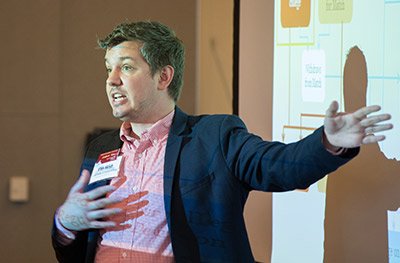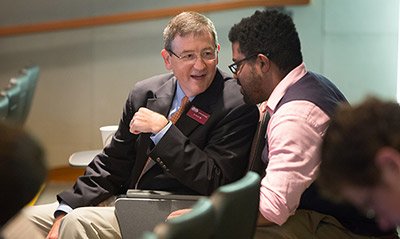Swarthmore Holds Its First College Access Summit

Andrew Moe, Associate Dean of Admissions and Director of Access
There’s no shortage of passion for increasing college access for underrepresented students. But the people with the power to do it often think and act independently of one another — a massive missed opportunity, says Andrew Moe, associate dean of admissions and director of access and programming.
To help fill the void, Swarthmore held its first-ever College Access Summit on campus Thursday, bringing more than 50 counselors and advisors from Mid-Atlantic high schools, colleges and universities, and community-based organizations together to exchange perspectives and develop solutions for an issue that President Valerie Smith says must be “a top national priority.”
“The work you’re doing today and to which you’re committed every day is vitally important,” says Smith in her welcome to the group. “As we know, education is a pathway to success, and the opportunity for success should not be predicated on a family’s ability to pay.”
Building on Swarthmore’s accelerated efforts on expanding access over the last two years, the summit offered workshops and seminars for and by an array of professionals who work closely with low-income and first-generation students.
“It was college access professionals from both sides of the desk discussing their experiences with and strategies for supporting underserved students in the college search and selection process,” says Moe. “The goal is to foster enough collaboration and insights to strengthen the pipeline of students not just going to, but successfully graduating from, college.”
 Vice President and Dean of Admissions Jim Bock '90 with Windsor Jordan '07, Senior Assistant Dean of Admissions & Director of Multicultural Recruitment.
Vice President and Dean of Admissions Jim Bock '90 with Windsor Jordan '07, Senior Assistant Dean of Admissions & Director of Multicultural Recruitment. Kaitlin Irvin, a college access and success manager for Summer Search Philadelphia who co-presented a session on college admissions and community-based organization collaboration, agrees. “When we can harness our collective knowledge and best practices and have a space to share, we don’t have to reinvent the wheel,” she adds. “We can therefore work smarter, not harder, which means we can more effectively serve our students.”
Discussion topics also included academic preparation and transition-to-college programs, how community colleges and four-year institutions can better support transfer students, financial aid opportunities for underserved students, and a Q&A with admissions officers.
“I’m reminded of how dizzying this whole process is for students, whatever their background, and certainly for those who may be the first in their family to go to college,” Smith says, in reference to the agenda. “It’s critically important for them to have the kind of support you all provide.”
The summit both benefited from and built upon relationships Swarthmore developed through its community college transfer and Spanish-language family events recently held in Philadelphia. That collaboration will continue, as Swarthmore created a digital resource in which summit attendees can compare notes and develop strategies for their daily work and the bigger-picture questions.
Among them: nationally, high-income college students graduate at a 77 percent rate, low-income students just nine percent, says Moe (at Swarthmore, the graduation rates for both groups is more than 90 percent). But the issue of college access transcends higher education.
“It couldn’t be more important in today’s world,” says Moe. “It relates to our economy, our healthcare system, job placement, day-to-day experiences and opportunities, and life expectancy.
“It really touches on every corner and sector of our lives,” he adds, “and if we’re serious about tackling some of the really large issues and problems that we have in the U.S. and around the world, we have to start with college access.”
Smith echoes that sentiment, stating that the commitment to diversifying higher education is not simply “a charitable impulse to uplift the underserved.”
“It will certainly improve the students’ life chances and inspire others to follow in their footsteps, but these students aren’t the only ones who will learn from these encounters and experiences,” she says.
“The process of change goes both ways. When we commit to diversifying our institutions, we improve our institutions and, by extension, our society.”
Learn more about Swarthmore's holistic approach to increasing access to underserved students, which includes admitting students without regard to their families' ability to pay and meeting their demonstrated need without requiring loans.
Learn more about Swarthmore’s commitment to access and inclusion at lifechanging.swarthmore.edu.


